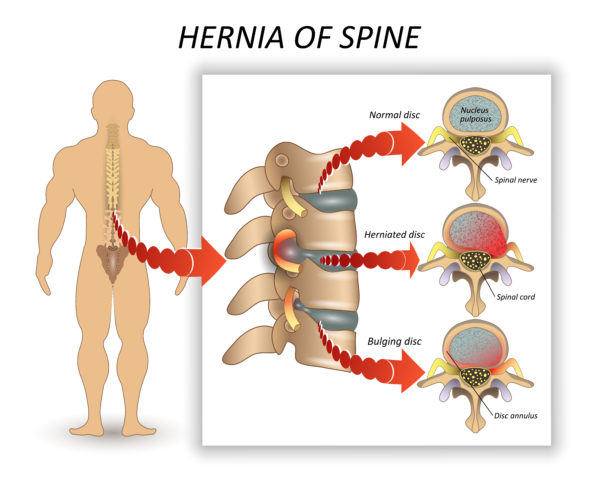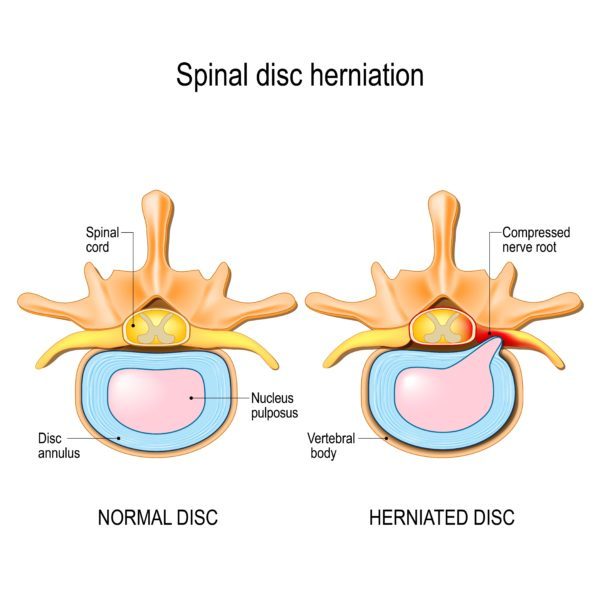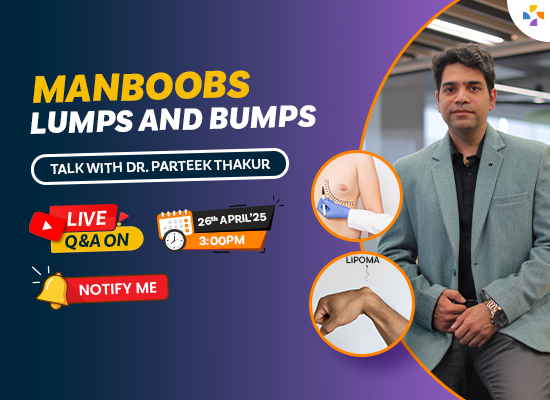
The way you are sitting right now with the laptop has a major impact on your posture. It causes back pain, especially in the lower back. But wait. Is this pain making your daily life and work impossible? Then this can be far worse and the cause can be something serious.
You have heard about a hernia in your groin or abdomen. But are you aware that a hernia can also occur in the spine? This is commonly referred to as ‘slipped disc’. When a part of the disc moves from one of the vertebrae of the spine, this is known as a lumbar hernia or herniated disc.
Also Read: Common Types of Hernia- Pictures
Table of Contents
Symptoms

A slipped or herniated disc can occur in any part of your spine, from neck to your lower back. But a slipped disc is more likely to occur in the lower back portion of the body. The spinal column is considered as a very important part of the body as this is an intricate network of nerves and blood vessels. When you have a slipped disc you put on extra pressure on the nerves and muscles around it.
Some of the common symptoms that people with slipped disc include-
- Pain and numbness
- You have the pain that extended to arms and legs
- Pain that worsens at night or for particular movements
- You experience the pain that worsens after standing or sitting for a long period of time
- Pain when you walk short distances
- You have tingling, aching, or burning sensation in the affected area
Causes

Before you understand the reason behind a slipped disc, you need to understand the structure of your spinal column. The spinal column is made up of a series of bones that are stacked one over another. Your spine can be divided into five parts-
- Cervical spine- Seven bones
- Thoracic spine- Twelve bones
- Lumbar spine- Five bones
- Sacrum- Five fused vertebrae
- Coccyx- Tailbone
These bones are protected by cushioned structures which are commonly referred to as discs. The disc is made of two parts-
- The inner portion which is soft and gelatinous
- An outer ring which is tough
A lumbar hernia or slipped disc occurs when the inner portion of the disc protrudes through the outer ring due to an injury or weakness. This is the reason it causes extreme pain and discomfort.
In extreme cases, the slipped disc can compress the spinal nerve. This compression causes numbness and pain around the affected nerve. In cases like these, doctors recommend surgery.
The chances of protrusion increase with some risk factors. Some of them are-
- Age which makes the muscles weak and bones brittle
- Certain motions like twisting or turning to lift an object
- Lifting heavy weights puts an extra strain on the lower back
- Being obese also increases the risk as the spine supports the additional weight
- Maintaining a sedentary lifestyle also increases the chances of a slipped disc.
Also Read: Things To Do and Avoid During Hernia
Complications
This might be quite a revelation for you. Leaving a slipped disc untreated for long can turn out to be disastrous as this can permanently damage the spinal nerve. In most extreme cases, the slipped disc can affect the nerves in the lower back and leg, this can make the bowel or bladder lose control.
Another complication that can arise is known as saddle anesthesia. Due to the compression of nerves, sometimes there is a loss of sensation in the inner thighs, the back of the legs, and around the rectum.
Treatment
The treatment of herniated disc depends majorly on two factors-
- The amount of discomfort you are experiencing
- The severity of the condition which means how far the disc has dislocated
In the initial stages after diagnosis, doctors recommend the following-
- Bed rest or limited activity for an initial couple of days followed by a gradual increase in activity over the next couple of weeks. Avoid strict bed rest because this can lead to muscle weakness and joint stiffness. Hence, make sure you stretch or practice low-impact activities such as walking.
- Apply heat to the area to get some relief from the unbearable pain. But if you have an injury near the region, treat it with ice or cold packs first and then apply heat.
- Exercise plays an important for the treatment of lumbar hernia. It is quite often that physical therapy, exercise, and massage with the help of an expert can help get some relief.
- There are painkillers that doctors prescribe when over-the-counter medications don’t respond. Some of them are muscle relaxers, narcotics to relieve pain or nerve pain medications.
If these don’t work after following judiciously for six weeks, then doctors recommend surgery. During surgery, the doctor does any of the following three-
- Microdiscectomy- Removing the damaged or protruded portion without removing the entire disc.
- Artificial disc surgery- The doctor replaces the disc with an artificial one.
- Spinal fusion- In this surgical procedure, the doctor fuses two or more vertebrae together permanently. This procedure permanently immobilizes the operated region of the spine.
Also Read: Possible treatments for Hernia
Prevention

It is indeed possible to prevent a herniated disc after all. Just follow these simple tips on a regular basis and you’ll be able to completely avert lumbar hernia.
- Bend and lift from your knees instead of waist.
- Try to keep an eye on your weight.
- Stretch periodically and don’t sit for long.
- Strengthen your lower back muscles by exercising regularly
Final words
So to sum it up, a hernia can also develop in the spine other than abdomen, groins or naval. An uncommon type of hernia, this herniated disk or lumbar hernia can cause pain and discomfort. Leaving this hernia untreated for a long period can be fatal and incur some permanent damage. Fortunately, you can follow some simple remedies to get relief and even cure the problem. But when there is no improvement after six weeks, doctors recommend surgery.
Also Read:








